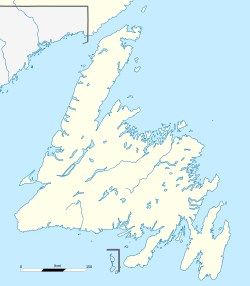Heart's Content, Newfoundland and Labrador
| Heart's Content | |
|---|---|
| Town | |
| Location of Heart's Content in Newfoundland | |
| Coordinates: 47°52′13″N 53°21′52″W / 47.87028°N 53.36444°WCoordinates: 47°52′13″N 53°21′52″W / 47.87028°N 53.36444°W | |
| Country |
|
| Province |
|
| Settled | 1677 |
| Area | |
| • Total | 62.81 km2 (24.25 sq mi) |
| Time zone | Newfoundland Time (UTC−03:30) |
| • Summer (DST) | Newfoundland Daylight (UTC−02:30) |
| Area code(s) | 709 |
| Location | Heart's Content Bay de Verde Peninsula Newfoundland Canada |
|---|---|
| Coordinates | 45°52′56.5″N 53°23′07.0″W / 45.882361°N 53.385278°W |
| Year first constructed | 1901 |
| Foundation | concrete basement |
| Construction | cast iron tower |
| Tower shape | cylindrical tower with balcony and lantern |
| Markings / pattern | white and red spiral painted tower, white lantern roof |
| Height | 8.8 metres (29 ft) |
| Focal height | 25.5 metres (84 ft) |
| Range | 8 nautical miles (15 km; 9.2 mi) |
| Characteristic | Oc. W 6s. |
| Admiralty number | H0510 |
| CHS number | CCG 468 |
| NGA number | 1716 |
| ARLHS number | CAN-543 |
| Managing agent | Canadian Coast Guard |
Heart's Content is an incorporated town in Trinity Bay on the Bay de Verde Peninsula of Newfoundland and Labrador, Canada. The natural harbour that makes up the town is located on the east side of Trinity Bay and it is built along the northeast side and the southeast base of this harbour.
The first references to Heart's Content came from John Guy's journal of his voyage into Trinity Bay in 1612. Through much of the 17th century, Heart's Content was used by migratory fisherman from England. The area was permanently settled by at least 1677.
Like many other Newfoundland English settlements, this small village was a victim to the French army of Pierre Le Moyne d'Iberville in 1697. During King William's War, this village was raided in the Avalon Peninsula Campaign.
Heart's Content was given its place in the history of international communications by Cyrus West Field who chose it as the terminus of his Transatlantic telegraph cable. In July 1866, when the cable was brought ashore, it was described as "a sheltered nook, where ships may ride at anchor safe from the storms of the ocean…on the beach is a small village of sixty houses, most of them the dwelling of these hardy men who vex the northern sea with their fisheries…"
Heart's Content did not depend on the cable industry alone for its economically successful standing. Besides the growing importance of the Labrador fishery and the seal hunt, as well as the shipbuilding industry, other economic stimuli made it a growing and prosperous community. Transportation connections between Heart's Content and the rest of the Avalon Peninsula improved and greatly accommodated the movement of people and goods, and the overall production of business improved the town and other areas of Trinity and Conception Bays.
...
Wikipedia

